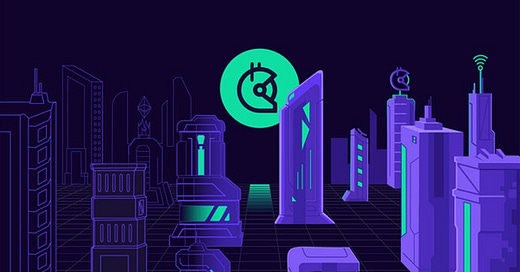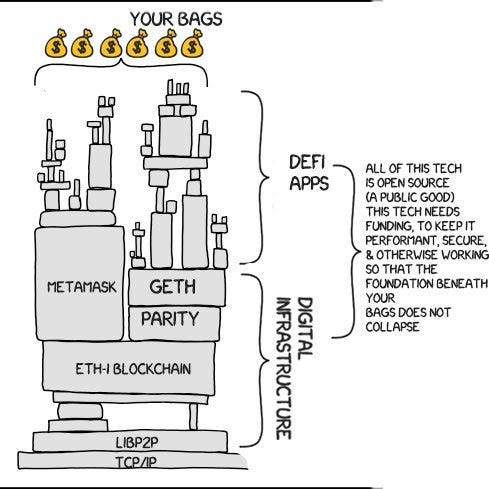Table of Contents 🕹️
Introduction 🐙
Gitcoin 🌳
The Path to Decentralization 🗺️
The Quadratic Lands 🌐
Further Down the Rabbit Hole 🕳️
“The unlimited replication of information is generally a public good.
- George Dyson
I. Introduction 👾
We are building new economic and cultural architecture for the digital age.
If our goal is to truly build a nation, we must tackle some of the most fundamental issues in society-formation.
Namely, we must slay Moloch, the god of coordination failure.
Coordination failure occurs when members of a group could achieve a more preferable outcome by working together, but fail to to do so because they do not coordinate on their decision making.
Recessions are an example of a coordination failure between firms and price setters. A firm might expect lower prices in the future so cut back on inventory purchases today. This results in lower futures prices as price setters adjust to lower demand.
Nuclear disarmament is another example. A nation that develops nuclear weapons is unlikely to relinquish them since, preferring instead to be able to defend themselves against other nations that have nuclear weapons.
These failures become vicious cycles culminating in situations we all recognize as sub-par but are unable to fix without somehow redesigning the rules of the game. They are so vicious that we have assigned the coordination failure concept a powerful demon avatar—Moloch.
One area where Moloch rears its ugly head the most is in the domain of public goods. A public good is a good that is both non-excludable and non-rivalrous.
The most common example of a public good is clean air. One individual breathing in clean air doesn’t diminish its supply for others. One can also not exclude someone from breathing it in if it is readily available. Unfortunately, no one has an incentive to cooperate on ensuring the air is always clean. Why would you donate your time or money to maintain air quality if you can just reap the benefits of clean air for free? This is known in economics as the free rider problem and is one of the greatest challenges to funding public goods.
Within the digital realm, public goods are foundational to our most vital technologies and applications. Digital public goods come in the form of open source software, data sets, AI models, and content.
It is estimated that open source software creates well over $500 billion of economic value each year, yet it is notoriously underfunded.
As we transition to an increasingly digital society, our economic and cultural actions will be dictated by the technological standards underpinning our applications. Do we prefer the black-boxes and intellectual property standards that exist in the world of Web 2.0, or will we seek to ensure our most vital infrastructure is readily available for anyone to audit, fork, or build upon.
In 1997, Eric Raymond, a free software advocate, wrote The Cathedral and The Bazaar, which compared two models of development: the Cathedral, where source code is written by a handful of developers in a closed fortress, and the Bazaar, the chaotic yet miraculously coherent organizational structure of open source development.
Most blockchain protocols and DeFi dApps are open source. Development is done in the open air, and anyone can begin contributing. It is a Bazaar—chaotic, but free. This is in contrast to Web 2.0 applications like Facebook or Twitter where code manifests into existence from behind ivory walls.
There is a deeper level to it though. Open Source Software is our digital infrastructure, and our civilization is increasingly digital.
- Kevin Owocki
If we are embarking on an age with programmable money and assets, where our economic and cultural systems runs on software, it makes sense to re-architecture the the way in which we fund public goods in order to incentivize open source as the default way of building things.
This is the philosophy behind Gitcoin.
II. Gitcoin 👾
Gitcoin was founded in 2017 by Kevin Owocki with the mission to grow and sustain open source software. The basement start-up quickly attracted the attention of Joe Lubin and ConsenSys, becoming a hub for experiments in novel funding models.
Since its founding, Gitcoin has grown its treasury to over $11 million (excluding the recent sizable donation of $AKITA tokens by Vitalik Buterin). It has provided $16 million of public goods funding via quarterly grants rounds and has paid $3.54 million in bounties directly to open-source developers worldwide.
The grants program has been very successful to-date. There have been a total of 1,638 grants and 9 matching rounds, the latter of which have grown from $38k in Q1 2019 to $1.9mm in March 2021.
For those unfamiliar with how Gitcoin Grants work, Gitcoin uses a quadratic funding model for determining how a pool of donor money is matched with charitable contributions from the community. Quadratic funding is based on the following formula:
While the math may appear intimidating, the concept behind it is relatively straightforward. The total matching funds distributed to each project is a function of the total number of individual contributors rather than the total amount raised. In other words, a project receiving one hundred $1 donations will receive a larger share of the matching donor pool than a project that received five $20 donations.
The result? The concentration of matching funds shifts away from projects with deep-pocketed donors to projects that provide the most value to the broadest swath of people.
This philosophical approach by Gitcoin has led to enormous growth in a community focused on the collective creation of open source software, an open internet, and open economies. This growth and this mission has attracted investments from leaders in the blockchain space, including from the likes of Paradigm, IDEO, 1kx, Electric Capital, Naval, Balaji, The LAO, MetaCartel Ventures, and many others.
III. The Path to Decentralization 👾
Gitcoin made headlines this past week after taking a further step toward decentralization by initiating the GitcoinDAO and airdropping the $GTC governance token to active participants.
GitcoinDAO aims to be the best place to collectively build and fund our digital infrastructure. With our ecosystem partners, we want to help create the biggest and boldest experiments in open source, and double down on what works. We are:
building a community that cares about public goods
designing & launching experiments
supporting & scaling them
collectively governing them
Here are some quick notes about $GTC:
Total supply: 100,000,000 tokens
Token distribution: 15% retroactive airdrop, 50% to the GitcoinDAO treasury (unlocked over 2 years via equal monthly installments from a time-lock contract), and 35% to existing stakeholders.
Qualifications: If you opened a bounty, submitted work to a bounty, opened a grant, or contributed to a grant, you might be eligible for the airdrop. You can check here.
GitcoinDAO will operate utilizing a fork of Compound’s governance framework. Anyone that has greater than 1% of the $GTC supply can put up a proposal to the community. Proposals will pass if they can reach a 2.5% quorum and a 51% majority.
Soft voting will be done off-chain via the Gitcoin Snapshot page. Hard voting performed on-chain will use Tally and any other services the community ultimately decides on.
Individuals can elect to delegate their $GTC to stewards if they so choose. The goal of the stewards program is to create a round table of individuals that analyze grant categories and sizes, determine what public goods the DAO cares about, address issues around sybil-attacks, and find ways to ensure everyone has an equal shot at a grant. For a full list of interested parties for the stewards program or to throw your own hat in the ring, check out this forum post. Stewards will likely be the main driver of meta-governance at GitcoinDAO.
In addition to the stewards program, work-streams that anyone can join are already forming around a variety of topics. Readers of this newsletter will recognize the similarities between the working groups of Index Coop and the work-streams forming at Gitcoin. These types of structures are vital organizational entities within decentralized frameworks, enabling anyone to contribute to the areas they care deeply about while making the DAO more efficient overall.
So far, the following work-streams have been proposed:
Public Goods Funding - Dedicated to rallying the community to fund public goods, setting criteria for funding rounds, and finding ways to get Gitcoin involved in funding new public goods.
Sybil Defenders - Analysis and brainstorming around identity and mechanism design solutions for Sybil-Resistance.
Progressive Decentralization - Tasked with finding ways to further decentralize Gitcoin’s architecture to the community.
Public Goods Prototyping - Building novel solutions to ecosystem problems.
Treasury Management - Creating a system for managing the community treasury.
If any of these work-streams interest you, I suggest hopping in the Discord to figure out ways to contribute. It’ll be interesting to see what new experiments and funding mechanisms are developed within the newly formed DAO.
IV. The Quadratic Lands 👾
While GitcoinDAO is an end in itself, it is also a means to another end: To chart a course to Quadratic Lands— a future-state where communities are empowered to build for the common good, and digital democracy reigns.
Gitcoin’s quadratic funding method is based on the concept of quadratic voting (QV). In this collective decision-making process, individuals allocate their votes to express the degree of their preferences, rather than just the direction of their preferences. By giving voters a total budget, they can allocate votes to whatever outcomes they desire. Each additional vote purchased in favor of a specific outcome costs more than the last. This means voting can capture the intensity of a voter’s preferences.
Research into QV has shown that this decision-making policy increases voter turnout and more accurately reflects the opinions of the public. Within democratic governance, QV is an attempt to combat tyranny of the majority by allowing the minority to purchase additional votes to level the playing field.
Adopting a QV governance method is on the roadmap for GitcoinDAO. To get there, it will be necessary to address Sybil Attacks, the biggest weakness to quadratic systems. A Sybil Attack is where an attacker utilizes fake or duplicate identities in order to influence outcomes. Proof of personhood systems are currently being tested by protocols like Proof of Humanity (future issue? 👀) and could be a way forward.
Gitcoin’s end goal is to build the Quadratic Lands—a vision of our decentralized future. It is utopian—a world where public goods are well-funded and our digital infrastructure runs on open source software. An open metaverse in direct contrast to the dystopian future of Ready Player One.
Quadratic Lands represents a destination where:
There are numerous opportunities to create financial sovereignty while working side-by-side with people who share similar values.
Individuals have sovereignty to make their own choices, but incentives are aligned for cooperation that generates both individual and community benefit.
The economic infrastructure is a set of economic games with transparent rules that cannot be changed without community consent.
The surface area of opportunity will increase exponentially as the tools compound upon each other.
$GTC is a passport to the Quadratic Lands. It enables governance over a major pillar of the decentralized economic system. It is a coordination mechanism for the infrastructure we will use to hopefully solve coordination failure. It is the sword we will use in the battle against Moloch.
Pick up your sword, join the Discord, participate on the governance forum, vote on the Snapshot proposals. Go be a citizen of the digital nation.
Let’s slay Moloch together.
V. Further Down the Rabbit Hole 🕳️
Meditations on Moloch by Slate Star Codex
The Evolution of Trust by Nicky Case
The Cathedral and the Bazaar by Eric Steven Raymond
Quadratic Payments: A Primer by Vitalik Buterin
Accelerated Capital is a weekly publication exploring how cryptoassets, DeFi, virtual reality, and other exponential technologies are transforming our economy, society, and culture.
Be sure to subscribe to this newsletter below and follow us on Twitter.












